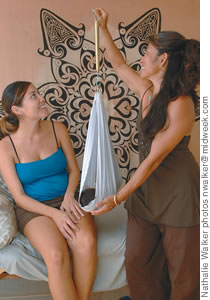Delivering Natural Care
Interviewed by Melissa Moniz
Wednesday - October 17, 2007
E-mail this story | Print this page | Comments (0) | Archive
 Del.icio.us Share
Del.icio.us Share

|
Can you describe your profession?
As a naturopathic physician, I have a family practice, so I see everyone from babies to adults. I see them for everything from ear infections, to cold and flu, to cancer and chronic illness. In addition to that naturopathic practice, I have a midwifery practice, where I see everything from infertility awareness to the pregnancy and delivery. I also do post-partum care, neonatal care and baby care.
What is the most exciting aspect of your job?
There are so many, but I think the most exciting part for both practices is seeing people become empowered, and seeing new things becoming birthed - whether it’s a baby or someone’s life that’s been stuck or stopped somehow because of illness or trauma. At a birth there’s this amazing energy that comes in that is unexplainable. It’s a very sacred experience and I feel very honored to be a part of it.
In your opinion, what is the biggest difference between a home birth and a hospital birth?
I think with a home birth it’s putting the power back in a moth-er’s and nature’s hands. It’s going back to a traditional way of looking at life and birth. I think, traditionally, birth is looked at as a natural practice and it’s not a problem or that a person is not sick. Hospitals were essentially designed for people who are ill. But when you are pregnant, you are the healthiest that you have ever been in your life. And also you have to trust mom’s intuition more than machines. It’s just a different setting.
That’s the thing about this practice - a lot of people think you need to be really brave to have a birth at home, but my clients would say, “You must be really brave to have a birth in the hospital.” So it just depends what your kuleana (responsibility/concern) is. I would never talk anyone into a home birth because it’s not for everyone.
I heard you recently did a delivery on Kahoolawe. Can you describe that experience?
They don’t talk too much about it yet because in Hawaiian culture they wait for babies to turn 1, and 1 hasn’t come up yet. But what I can say is that it was the most amazing experience. Just flying over in a helicopter in the middle of the night and there was a lot of protocol. There were many forms to be filled out to make sure it was all done really pono (proper). We needed to have emergency vehicles available. It was amazing because that island is a birthing island, and there have been no recorded births there for so long. They announced it on the news when it happened, but they didn’t say names. However, the one-year birthday is coming up in January, so I think they’re going to talk about it more then.
What’s the most challenging aspect of your job?
Being on call all the time. It’s not like a conventional obstetrician where you have a physicians’ exchange. So I have to be there, and I am there the whole time. I mean, I’ve been with moms for two days. So it’s a time factor and it’s really important to balance the rest of my life.
About how many births do you average in a month?
It really varies, but the short answer would be about four.
Some months are more and births cluster. For example, this summer I did six births in 10 days. That was really hard.
Can you talk a little about water births?
More and more people are choosing water births these days because warm water relaxes the muscles, and a lot of the reason why labor takes so long is because the uterus is the largest muscle in the woman’s body and it needs to relax to dilate. It also helps with the pain, so a lot of women like to labor in the water. Showers are good, but you can’t just sit and totally relax. And it’s big enough that mom and dad can be in the tub. So a lot of moms are choosing that. More than half are choosing it. And they also like to birth in the water because it relaxes their perineum, and it doesn’t tear as much. It’s so peaceful for the baby too - it just seems less shocking.
Are your two professions separate or do they overlap?
They overlap a lot because of the babies and children, and I also do a lot of naturopathic care with the mothers during pregnancy. And the other thing is I also see generations - it’s really family medicine. You learn a lot about people.
E-mail this story | Print this page | Comments (0) | Archive
Most Recent Comment(s):













